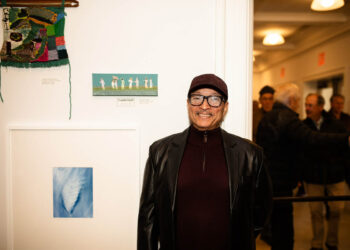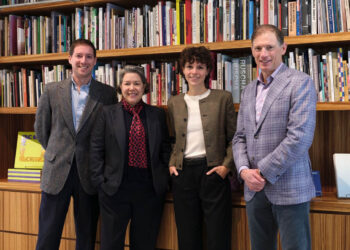A Private War was one of two films featured at the Hamptons International Film Festival (HIFF) that focused on the life of Marie Colvin, a remarkable, celebrated war correspondent who lost her life while in the field covering the siege of Homs in Syria.
Based on Marie Brenner’s Vanity Fair article Marie Colvin’s Private War, the film made its East Coast premiere at Guild Hall on Sunday, October 7 during a viewing that brought out director Matthew Heineman, actress Rosamund Pike, who plays Colvin, and actor Jamie Dornan, who plays Paul Conroy, a British freelance photographer that frequently collaborated with Colvin.
After the screening, the trio spoke with HIFF Artistic Director David Nugent about the film.
“My background is in documentary film. This film means many, many things to me. It’s obviously an homage to Marie, it’s an homage to journalism,” Heineman explained. “I think in this time when the truth is under attack, we live in this world of ‘fake news,’ it’s so important to celebrate people like Marie who are fighting for the truth and trying to expose atrocities around the world. I think we often read these stories and see these headlines, but don’t understand what it takes to get it onto the page.”
After Pike learned there was a film being made about Colvin, she immediately wanted to be involved. “I grew up in London so I was aware of Marie’s journalism growing up. A filmmaker friend of mine said that someone was planning on making a film about Marie Colvin and it made me go and think about her again. I found Marie Brenner’s article and it was just so exciting to read it as an adult, I suppose, about this woman who was so courageous – not necessarily fearless – I think the real courage comes from having fear and going through with it anyway and what the cost of dedicating your life to an extreme level of empathy,” Pike told the crowd. “I suppose there’s a level of crossover, a little bit, between that and what we do, although we stay safe. Then I heard that Matthew was going to direct it and that seemed like a perfect marriage of subject matter and director. So I tried very hard to meet him – for about a year before I finally did meet him. Then we began a long collaboration of research and I suppose I realized somewhere in the process we were undertaking a level of research akin to how Marie would investigated a story.”
Before filming started, Pike set out to capture Colvin’s mannerisms. “Marie Colvin was such an inimitable presence. She left such a profound impact, clearly, on everybody that met her. And she had a few things, she had this tremendous vivacity, this wonderful laugh, a tremendous presence, but also one of the most interesting psychicalities of anybody I ever watched. I think, she seemed, to me, to be someone who really carried her profession through her whole body,” Pike relayed. “I spent hours in the rehearsal room with lots of mirrors trying to sit like her, walk like her, smoke like her, hold my head like her, crouch, run, carry a backpack, write notes, lots of things.”
“She is one of the most dynamic, incredible people that you can watch. It was a privilege,” Pike added.
Part of that prep also included watching hours upon hours of video on Marie, even while on set. “The first day on set, which was my first day on any movie set, after the first take Ros was on her cellphone and I turned to Jamie or somebody else and was like, ‘This is a bit unprofessional,'” Heineman noted. “‘Is she texting her friends or what’s happening?’ And between every single take during the three months of shooting, she would watch tape of Marie on her phone just to get the voice and movement.”
For Dornan, it was a tremendous asset to be able to connect with Conroy. “It was just such a privilege to be able to have that access – invaluable as an actor if the person you’re portraying is a constant presence on set,” Dornan noted. “He’s quite a character.”
Initially Conroy was set to visit the set for a short period of time, but that quickly changed. “He came out to Jordan where we shot for a week or two to give us a bit of guidance and get us going early in the process and we couldn’t get rid of him,” Dornan joked. “We had him there for the entirety of the shoot and actually ended up becoming our stills photographer on the set, which was quite trippy to be honest. He’s become a dear friend of mine and I love him dearly. Even from a practical point of view for Ros and I to be able to mine his brain and get every morsel of information about the situations those guys find themselves in and then selfishly for me doing his accent which is very, very far away from mine. So having him there the whole time was my version of Ros putting with earbuds in. I could literally go and talk to the guy, so I was very, very lucky.”
For Heineman, A Private War was his first feature film. “It was an experience. I’m very grateful to tell this story. I think the basis of documentaries for me is trust and honesty with your subjects and I think that’s what allows you to get these sort of special documentary moments,” he noted. “I think for me, that was the basis of working with actors too – trust and that intimacy and allowing them to be themselves. In that sense it was quite similar.”
One of the challenges Pike faced while getting ready for the film was trusting that she had what it takes to portray Marie on the screen.
“Preparing for it was pretty nerve wrecking because there were so many things to change, which as an actor is pretty exciting, but it’s also daunting. I felt every time I met one of Marie’s friends who were so generous in sharing their memories and insight, but I felt they must be looking at me thinking well this is never going to work…,” she said. “Which I had to sort of steer myself against that. They were obviously too polite to say that, by and large, but not all of them. I had to be older, there wasn’t much I didn’t change – including my teeth.”
 |
|
Rosamund Pike, Jamie Dornan, Matthew Heineman, and David Nugent. (Photo: Getty) |
Filming took an emotional toll on the actors, and Pike was actually brought to tears as she recounted working with the film’s extras. “Matt, coming from a documentary background, he was not going to stand for any pretense so in all the conflict zones the background actors are pretty much displaced people from all those regions living in Jordan where we filmed. Frequently I think people agree to be in a film because they can earn a day’s money and maybe more than they can earn in their other jobs and they’re not perhaps anticipating the level of authenticity that’s created by a film set,” she noted. “For instance, in the mass grave scene in Iraq, those women were completely genuinely distraught as our digger started to dig up remains. Also, in the clinic where we filmed, we recreated a bit of footage that she showed on CNN. The father who played the father of the little boy, he was a man who had his best friend’s two-year-old shot off his shoulder and when he came in and saw this little boy lying on the bed, the grief that came out of that man was so painful and real and I suppose those moments were testing on a different level to anything that Jamie or I had ever experienced on a film. It really tested the line between artifice and reality I suppose – so those moments were challenging.”
Pike also teared up while speaking about the extraordinary journalist, as many of Colvin’s family members were in the audience. “I discovered what a huge romantic she was. Marie was such a romantic at heart,” Pike said about the research she did on Colvin for the film. “And how she had such hope – not at all naïve – but really believed passionately that going out into these places, experiencing this level of empathy, she would embed deeper than most journalists. She knew that you were always going to get the closest story by sleeping in the same places as the people you were trying to get to know, by eating the same food, drinking the same water, being with them. I think she believed what she did could change situations, which frequently it did.”
That deep commitment to her process is something Pike relates to. “I think I identify with the nature of life making a sort of sense when you’re in the field. That there’s a kind of life reduced to a certain simplicity because the stakes are very clear,” she noted. “You have one sole purpose and I can often feel that when I’m working and then I come back home and I don’t really know how to be me. I have my wardrobe and I look at these clothes and they don’t make any sense to me. I know that Marie was very chaotic with her paperwork and I’m very, very much like that.”
Heineman, Pike and Dornan were all appreciative that the film will once again bring awareness and the conversation back to the global crisis that is still ongoing.
“I think with Syria now, I feel very, very passionate about the situation in Syria. I’m excited that this film is going to be talking about Syria at a time where the conversations have dwindled and people are finding it harder, especially the people that are fighting for awareness, to stay in people’s consciousnesses. It’s a very apt moment for us to just remind people that this is still going on, that people are being detained and that means tortured and forcibly disappeared and likely killed. That people are still living in fear of their lives in Syria,” Pike concluded. “There is still a huge struggle in control of the narrative. It’s certainly made me think daily of all those things – particularly Syria.”
“My goal as a documentary filmmaker is to put a face to human conflicts and I think that’s very much what Marie stood for,” Heineman relayed. “As Ros talked about, one of the tragedies at the end of the film is that this conflict persists to this day. She died six years ago and 500,000 civilians have been killed since then.”
“I think anything that can shed further light on the predicament of civilians in these places is a good thing,” Dornan added. “No matter what medium, sometimes it takes a photograph – a boy washed up on a beach – for people to sort of stop and take note. Anytime you can add to the awareness of what’s going on, I think it’s a good thing.”












